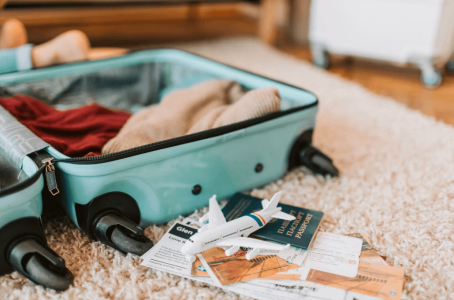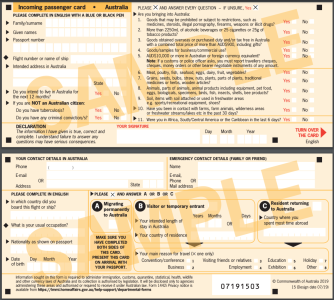Watch out: This little-known rule caught a traveller by surprise and almost cost her a whopping $2,000
- Replies 12
If you've travelled abroad before, chances are you've experienced the confusion that comes with trying to understand customs regulations on your way back into Australia. It can be a daunting task, but don't worry - you're not alone in feeling overwhelmed by the process. We've all been there at some point or another.
Amidst the still-ongoing threat of COVID-19, navigating customs and quarantine regulations can be a daunting task, with a plethora of conflicting information and seemingly endless rules and restrictions.
Several questions arise, such as: What is permitted and what is prohibited? What can be brought into the country, and what must be left behind? And how much of each item is allowed? It can be a maze of confusion and uncertainty!
Such was the experience of Traci Chen, who, upon returning from a mother-and-daughter holiday trip in Dubai late last December, was subjected to the wrath of a strict customs agent.

In accordance with Australian law, passengers arriving in Australia are obligated to accurately identify themselves and furnish specific information through the completion of an Incoming Passenger Card (IPC).
Passengers entering Australia are required to accurately provide the following information on both sides of the IPC:
Ms Chen declared 'yes' on questions seven and eight – regarding possible plant and animal products – on her passenger form, knowing she was carrying saffron and honey.
However, as her bags were being run through the scanner, she was interrogated over a little-known customs rule, a breach of which carried a penalty of anywhere between $500 to over $2,000.
Ms Chen, who works as a migration lawyer in Melbourne, detailed the story on TikTok, recalling how the officer told her: 'I'm going to give you one last chance to declare to me everything you have brought through because I can see on the scanners what you brought through.'
As Ms Chen and her mother frantically tried to determine the cause of the issue, a sudden realisation dawned upon the latter: a floppy straw hat purchased in Australia could be the culprit.
Upon closer inspection, the customs agent also pointed out that the 'organic' makeup wipes they brought could potentially be classified as organic produce.
Though they were ultimately allowed to pass through customs with the items in tow and no fine was imposed, the experience proved to be a particularly stressful one for Ms Chen's mother, whose proficiency in English is limited as it is her second language.
'The customs lady told me: if you're in doubt, declare everything. But the problem was that she wanted me to be able to identify it,' she said.
'I would happily declare everything in my luggage and let them take a look, but there's clearly no way I could tell them exactly which items they might be concerned about.'

Members, if you are travelling overseas and bringing something back, make sure you do your research and read up on the customs laws and regulations before you go through customs, so you don't get caught out like Ms Chen did.
And, if you're unsure, declare it! That's what the customs office is for. You can always check with the agents if something you're bringing in is allowed or not, but concealing items and not declaring them can lead to some hefty fines.
We wish you happy and stress-free travelling, everyone!
Amidst the still-ongoing threat of COVID-19, navigating customs and quarantine regulations can be a daunting task, with a plethora of conflicting information and seemingly endless rules and restrictions.
Several questions arise, such as: What is permitted and what is prohibited? What can be brought into the country, and what must be left behind? And how much of each item is allowed? It can be a maze of confusion and uncertainty!
Such was the experience of Traci Chen, who, upon returning from a mother-and-daughter holiday trip in Dubai late last December, was subjected to the wrath of a strict customs agent.

An Aussie traveller revealed how a little-known customs rule nearly cost her $2,000 at Brisbane Airport. Credit: Pexels/Vlada Karpovich.
In accordance with Australian law, passengers arriving in Australia are obligated to accurately identify themselves and furnish specific information through the completion of an Incoming Passenger Card (IPC).
Passengers entering Australia are required to accurately provide the following information on both sides of the IPC:
- family/surname, given names and passport number
- flight number or name of ship
- intended address in Australia
- if they intend to live in Australia for the next 12 months
- declarations relating to customs and quarantine
Ms Chen declared 'yes' on questions seven and eight – regarding possible plant and animal products – on her passenger form, knowing she was carrying saffron and honey.
However, as her bags were being run through the scanner, she was interrogated over a little-known customs rule, a breach of which carried a penalty of anywhere between $500 to over $2,000.
Ms Chen, who works as a migration lawyer in Melbourne, detailed the story on TikTok, recalling how the officer told her: 'I'm going to give you one last chance to declare to me everything you have brought through because I can see on the scanners what you brought through.'
As Ms Chen and her mother frantically tried to determine the cause of the issue, a sudden realisation dawned upon the latter: a floppy straw hat purchased in Australia could be the culprit.
Upon closer inspection, the customs agent also pointed out that the 'organic' makeup wipes they brought could potentially be classified as organic produce.
Though they were ultimately allowed to pass through customs with the items in tow and no fine was imposed, the experience proved to be a particularly stressful one for Ms Chen's mother, whose proficiency in English is limited as it is her second language.
'The customs lady told me: if you're in doubt, declare everything. But the problem was that she wanted me to be able to identify it,' she said.
'I would happily declare everything in my luggage and let them take a look, but there's clearly no way I could tell them exactly which items they might be concerned about.'
Key Takeaways
- Australian travellers should always declare any plant/animal/organic products they are bringing into the country, as failure to do so could result in a hefty fine.
- According to a lawyer, these restrictions include certain items, such as floppy straw hats and organic make-up wipes.
- Customs agents are known to be strict and inflexible with their regulations, and can be intimidating if a traveller fails to declare an item.
Members, if you are travelling overseas and bringing something back, make sure you do your research and read up on the customs laws and regulations before you go through customs, so you don't get caught out like Ms Chen did.
And, if you're unsure, declare it! That's what the customs office is for. You can always check with the agents if something you're bringing in is allowed or not, but concealing items and not declaring them can lead to some hefty fines.
We wish you happy and stress-free travelling, everyone!








